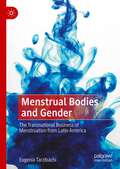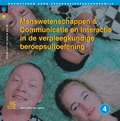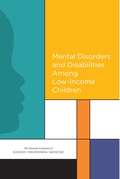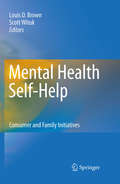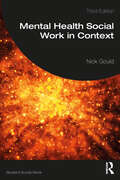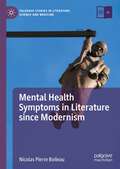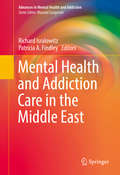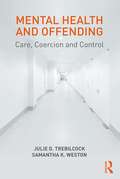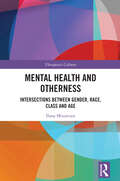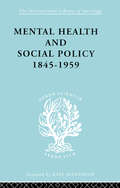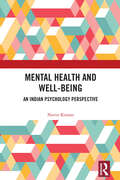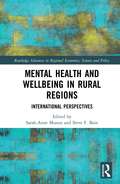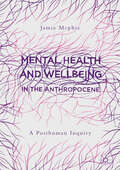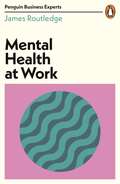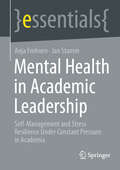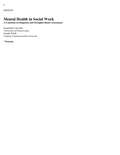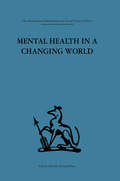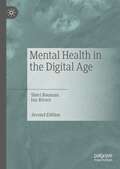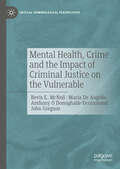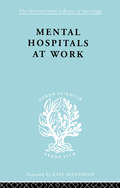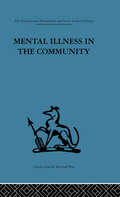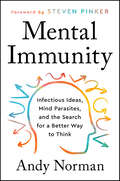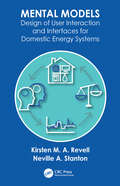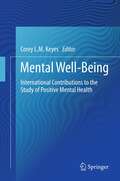- Table View
- List View
Menstrual Bodies and Gender: The Transnational Business of Menstruation from Latin America
by Eugenia TarzibachiThis book interrogates how the so-called “Feminine Care” industry travelled from the United States to Latin America via manufactured and disposable menstrual management technologies and certain narratives about menstrual bodies. The author focuses on Argentina as a case study to deepen the analysis of transnational politics and business practices around menstruation, drawing on women’s voices to unveil why menstruation is still a bodily process that is natural yet taboo in Latin America. This fascinating volume is a must-read for anyone interested in how the “Feminine Care” industry helped reify the insidious social mandate of shame and secrecy over women’s bodily experiences.
Menswetenschappen & communicatie en interactie in de verpleegkundige beroepsuitoefening
by Hilde De Vocht J.H.J. de JongIn dit boek wordt ingegaan op psychologie, sociologie, antropologie, filosofie en agogiek, zodat een compleet boekwerk voor de menswetenschappen ontstaat. Het boek kent drie delen: theorie, toepassing in de beroepsuitoefening, toepassing bij specifieke zorgcategorieen
Mental Disorders and Disabilities Among Low-Income Children
by Thomas F. BoatChildren living in poverty are more likely to have mental health problems, and their conditions are more likely to be severe. Of the approximately 1. 3 million children who were recipients of Supplemental Security Income (SSI) disability benefits in 2013, about 50% were disabled primarily due to a mental disorder. An increase in the number of children who are recipients of SSI benefits due to mental disorders has been observed through several decades of the program beginning in 1985 and continuing through 2010. Nevertheless, less than 1% of children in the United States are recipients of SSI disability benefits for a mental disorder. At the request of the Social Security Administration, "Mental Disorders and Disability Among Low-Income Children" compares national trends in the number of children with mental disorders with the trends in the number of children receiving benefits from the SSI program, and describes the possible factors that may contribute to any differences between the two groups. This report provides an overview of the current status of the diagnosis and treatment of mental disorders, and the levels of impairment in the U. S. population under age 18. The report focuses on 6 mental disorders, chosen due to their prevalence and the severity of disability attributed to those disorders within the SSI disability program: attention-deficit/hyperactivity disorder, oppositional defiant disorder/conduct disorder, autism spectrum disorder, intellectual disability, learning disabilities, and mood disorders. While this report is not a comprehensive discussion of these disorders, "Mental Disorders and Disability Among Low-Income Children" provides the best currently available information regarding demographics, diagnosis, treatment, and expectations for the disorder time course - both the natural course and under treatment.
Mental Health Self-Help
by Scott Wituk Louis D. BrownBuilding on earlier patient-empowerment movements, consumer- and advocate-driven mental health self-help (MHSH) initiatives currently outnumber traditional mental health organizations. At the same time, this apparent success raises significant questions about their short-term efficacy and their value to lasting recovery. Mental Health Self-Help assembles the state of the evidence on the effectiveness of MHSH, beginning with the individual and larger social factors behind the expansion of consumer-directed services. Clearly organized and accessibly written, the book traces the development and evolution of MHSH as both alternative and adjunct to traditional mental health structures, offers research-based perspectives on the various forms of MHSH, and identifies potential areas for consumer initiatives to work with--and help improve--mental health systems. Contributors weigh strengths and limitations, raise research and methodology questions, and discuss funding and training issues to give readers a deeper understanding of the field and an informed look at its future impact on mental health treatment. Individual chapters cover the spectrum of contemporary self-help initiatives in mental health, including: * Online mutual aid groups. * Consumer-run drop-in centers. * Family and caregiver groups. * Certified peer support specialists. * Consumer advocacy initiatives. * Technical assistance organizations. * Professional/self-help collaborations. Mental Health Self-Help is a bedrock guide to an increasingly influential aspect of the mental health landscape. Researchers studying these initiatives from a variety of fields including community and clinical psychology, and public health--as well as clinicians, counselors, social workers, case managers, and policymakers--will find it an indispensable reference.
Mental Health Social Work in Context (Student Social Work)
by Nick GouldThis new edition of Mental Health Social Work in Context continues to be an authoritative, evidence-based introduction to a core area of the social work curriculum. Grounded in the social models of mental health particularly relevant to qualifying social workers, but also intended to familiarise students with social aspects of medical perspectives, this core text helps to prepare students for practice and to develop their knowledge around: • promoting the social inclusion of people with mental health problems; • the changing context of multidisciplinary mental health services; • an integrated evidence base for practice; and • working with people with mental health problems across the life course. Including new material on proposed reforms to mental health and mental capacity legislation, this book also contains major revisions that focus on the statutory and policy contexts of social work practice as well as ongoing changes in the organisational frameworks for the delivery of services and implications for the social work role. This fully updated third edition is an essential textbook for all social work students taking undergraduate and postgraduate qualifying degrees, and it will also be invaluable for practitioners undertaking post-qualifying awards in mental health social work.
Mental Health Symptoms in Literature since Modernism (Palgrave Studies in Literature, Science and Medicine)
by Nicolas Pierre BoileauThe Function of Symptoms in British Literature since Modernism looks at various ways of treating symptoms of psychological disorders in the literature of the long twentieth century. This book shows that literature can, in its questioning of commonly accepted views of this lived experience of psychic symptoms, help engender new theories about the functioning of subjective cases. Modernism emerged at about the same time as Freudian psychoanalysis did and the aim of this book is to also show that to a certain extent, Woolf preceded Freud in her exploration of the symptom and contributed to fashioning another approach that is now more common, especially in writers from the 1990s-onwards.
Mental Health and Addiction Care in the Middle East
by Richard Isralowitz Patricia A. FindleyThis ambitious resource describes innovative intervention programs for treating substance abuse and other mental health problems in the Middle East in the context of larger issues in the region. Deftly combining clinical acumen with in-depth knowledge of sociopolitical currents, contributors present data and analysis on similarities and differences within the region, addiction issues in special populations (youth, mothers, immigrants), and the efficacy of local and international initiatives. New trends in evidence-based responses, including mental health services in war and disaster, are related to the larger goals of promoting peace. To that end, the editors go beyond the concept of shared problems to discuss strategies toward shared solutions, most notably psychological first aid as a healing approach to mediation. Among the topics covered: · Drug abuse in the Middle East: promoting mutual interests through resistance and resilience. · Toward uniform data collection and monitoring of Israeli and Palestinian adolescent drug use. · Substance abusing mothers: toward an understanding of parenting and risk behavior. · Immigration, acculturation, and drug use. · Psychological first aid: a tool for mitigating conflict in the Middle East. · Collaborative approaches to addressing mental health and addiction. For health psychologists, psychiatrists, clinical social workers, and addiction counselors, Mental Health and Addiction Care in the Middle East demonstrates the deep potential for mental health and social issues to be addressed to benefit all communities involved.
Mental Health and Offending: Care, Coercion and Control
by Julie D. Trebilcock Samantha K. WestonThis book explores the controversial relationship between mental health and offending and looks at the ways in which offenders with mental health problems are cared for, coerced and controlled by the criminal justice and mental health systems. It provides a much-needed criminological approach to the field of forensic mental health. Beginning with an exploration into why the relationship between mental health and offending is so complex, readers will be introduced to a range of perspectives through which mental health and its relationship to offending behaviour can be understood. The book considers the politics surrounding mental health and offending, focusing particularly on the changing policy response to mentally disordered offenders since the mid-1990s. With dedicated chapters concerning the police, courts, secure services and the community, this book explores a range of issues including: • The tensions between the care, coercion and control of mentally disordered offenders • The increasingly blurred boundaries between mental health and criminal justice • Rights, responsibilities, accountability and blame • Risk, public protection and precaution • Challenges involved with treatment, recovery and rehabilitation • Staffing challenges surrounding multi-agency working • Funding, privatisation and challenges surrounding service commissioning • Methodological challenges in the field. Providing an accessible and concise overview of the field and its key perspectives, this book is essential reading for undergraduate and postgraduate courses in mental health offered by criminology, criminal justice, sociology, social work, nursing and public policy departments. It will also be of interest to a wide range of mental health and criminal justice practitioners.
Mental Health and Otherness: Intersections between Gender, Race, Class and Age (Therapeutic Cultures)
by Ilana MountianBased on two decades of research in Brazil and the UK, this book explores the ways in which intersections of gender, race and class affect the positioning of the subject as 'Other' in discourses of health, and how the positioning of the subject as 'Other' has implications for health research and mental health practice.Drawing on feminist, post-colonial and decolonial studies, psychoanalysis and discourse analysis, Mental Health and Otherness examines the experiences of immigrants, drug users and transsexual people in health and mental health settings, and the ways in which stereotypical understandings can affect the subject.This book is a study of the discursive construction of ideas about health and mental health in the West and the awareness of processes of othering in clinical practice. It will appeal to scholars in psychology, sociology and cultural studies with an interest in mental health, health care and intersectionality.
Mental Health and Palestinian Citizens in Israel (Indiana Series In Middle East Studies)
by Edited by Muhammad M. Haj-Yahia, Ora Nakash, and Itzhak LevavSocial work studies examining the mental health issues faced by Arab-Palestinian service users, their families, and their communities in Israel.Minorities face particular social strains, and these are often manifested in their overall mental health. In Israel, just under a quarter of the citizens are Arab Palestinians, yet very little has been published exploring the spectrum of mental health issues prevalent in this population. The work collected here draws on the first-hand experience of experts working with Israeli Palestinians to highlight the problems faced by service users, their families, and their communities. Palestinians in Israel face unique social, gender, and family-related conditions that also need reliable research and assessment. Mental Health and Palestinian Citizens in Israel offers research and observation on three central topics: socio-cultural determinants of mental health, mental health needs, and mental health service utilization. From suicidal behaviors and addiction to generational trauma and the particular concerns of children and the elderly, this broad and careful collection of research opens new dialogues on treatment, prevention, and methods for providing the best possible care to those in need.
Mental Health and Social Policy, 1845-1959 (International Library of Sociology)
by Kathleen Jones"First Published in 1998, Routledge is an imprint of Taylor & Francis, an informa company."
Mental Health and Well-being: An Indian Psychology Perspective
by Navin KumarThe book analyses mental health, well-being, and their interdependence through Indian perspectives. It offers critical insights on mastering wellness, stress, and coping, suffering and healing, and achieving work-life balance. Describing key concepts of the Indian philosophical thought with contemporary implications, the volume focuses on explaining the how mental health and mental well-being are correlated. It examines the dynamic interplay of biological, social, psychological, ecological, cultural, religious, and spiritual factors that affect individuals in their everyday lives and act as contributing factors to our illness or wellness. The book also explores in-depth Indian traditions of spirituality and their significant contributions to mental well-being, including discussions on concepts found in Ayurveda and Yoga. This book will be of interest to students, researchers, and teachers of psychology, applied psychology, clinical and counselling psychology, and wellness. It will also be very helpful for academicians, mental health professionals, counsellors, and those working in health and wellbeing industries.
Mental Health and Wellbeing in Rural Regions: International Perspectives (Routledge Advances in Regional Economics, Science and Policy)
by Sarah-Anne Munoz Steve F. BainThis book considers how rurality interacts with the mental health and wellbeing of individuals and communities in different regional settings. Through the use of international and comparative case studies, the book offers insight into the spatiality of mental health diagnoses, experiences, services provision and services access between and within rural areas. It is the first book to specifically address rural mental health geographies from an international perspective, and will be of interest to researchers and policymakers in rural studies, regional studies, health geography and rural mental health.
Mental Health and Wellbeing in the Anthropocene: A Posthuman Inquiry
by Jamie McphieThis book makes the unorthodox claim that there is no such thing as mental health. It also deglamourises nature-based psychotherapies, deconstructs therapeutic landscapes and redefines mental health and wellbeing as an ecological process distributed in the environment – rather than a psychological manifestation trapped within the mind of a human subject. Traditional and contemporary philosophies are merged with new science of the mind as each chapter progressively examples a posthuman account of mental health as physically dispersed amongst things – emoji, photos, tattoos, graffiti, cities, mountains – in this precarious time labelled the Anthropocene. Utilising experimental walks, play scripts and creative research techniques, this book disrupts traditional notions of the subjective self, resulting in an Extended Body Hypothesis – a pathway for alternative narratives of human-environment relations to flourish more ethically. This transdisciplinary inquiry will appeal to anyone interested in non-classificatory accounts of mental health, particularly concerning areas of social and environmental equity – post-nature.
Mental Health at Work (Penguin Business Experts Series)
by James RoutledgeIt has never been more essential to support our mental health at work. With one in four people experiencing poor mental health right now, we need to start talking about it. Penguin Business Expert James Routledge has worked with CEOs, HR directors, managers and people at all levels on successful mental-health strategies. In this book, he shares his stories, learnings and guidance. Learn how to:- Talk comfortably about mental health- Create a more open and inclusive community in your workplace- Implement unique changes that are authentic to you and your businessFilled with honest and relatable stories, 'conversation starters' and exclusive case studies from a diverse range of businesses and their people, Mental Health at Work will support anyone with their mental health in the workplace journey.
Mental Health in Academic Leadership: Self-Management and Stress Resilience Under Constant Pressure in Academia (essentials)
by Anja Frohnen Jan StammLeaders in academia need dependable strategies to support and strengthen their mental health. This essential guide explores the unique challenges within the academic system and offers practical solutions for managing stress. Overcoming stress-inducing thought patterns fosters resilience, while smart work organization—such as the Management House method—can unlock significant relief potential. This resource provides valuable insights for human resource development and workplace health management in higher education institutions. A practical and empowering guide for academic leaders.
Mental Health in Social Work: A Casebook on Diagnosis and Strengths-based Assessment
by Jacqueline Corcoran Joseph WalshMental Health in Social Work: A Casebook on Diagnosis and Strengths-based Assessment emphasizes gaining competency in the DSM-5 diagnoses of mental disorders that are commonly seen in clinical and social service settings. Using a case-based approach, students and professionals learn to understand clients holistically as they proceed with the assessment and intervention process. <p><p> The 3rd Edition includes new chapters on obsessive-compulsive disorder (Ch. 9), post-traumatic stress disorder (Ch.10), and gender dysphoria (Ch. 14) It also includes additional content on socially diverse populations throughout the text, and new “Questions to Consider” for making a DSM diagnosis are included with each case study.
Mental Health in a Changing World: Volume one of a report on an international and interprofessional study group convened by the World Federation for Mental Health
by Kenneth Soddy Robert H Ahrenfeldt Mary C KidsonTavistock Press was established as a co-operative venture between the Tavistock Institute and Routledge & Kegan Paul (RKP) in the 1950s to produce a series of major contributions across the social sciences. This volume is part of a 2001 reissue of a selection of those important works which have since gone out of print, or are difficult to locate. Published by Routledge, 112 volumes in total are being brought together under the name The International Behavioural and Social Sciences Library: Classics from the Tavistock Press. Reproduced here in facsimile, this volume was originally published in 1965 and is available individually. The collection is also available in a number of themed mini-sets of between 5 and 13 volumes, or as a complete collection.
Mental Health in the Digital Age
by Sheri Bauman Ian RiversThis second edition of this highly impactful book examines the intersection of mental health and digital technology to make informed decisions about the new options provided by digital technology. It highlights the rise in online therapy and social media and examines the ethical dilemmas involved in online research to suggest that the benefits created far outweigh the possible risks. This expanded and updated second edition, includes practical suggestions for clinicians and public, builds upon the first by updating readers on recent developments in technology and research in this area since 2015. It explores ways in which governments and practitioners responded to the mental health crisis caused by the Covid-19 pandemic, and looks at the challenges as well as the benefits of our increasing interaction online.
Mental Health, Crime and the Impact of Criminal Justice on the Vulnerable (Critical Criminological Perspectives)
by John Gregson Bevis E. McNeil Maria De Angelis Anthony Ó Donnghaile-DrummondThis book addresses a variety of key issues surrounding mental health and the criminalization of certain individuals and groups by the Criminal Justice System and the impact this can have on their mental health. It challenges the assumption that people with mental health problems are in some way a risk or danger to society (and themselves) and therefore have a greater propensity for committing crimes, when in reality they are more likely to become the victims of crime. It argues that the misguided correlations drawn between mental health and crime, as perpetuated by the media, policy makers, clinicians, agents of the criminal justice system, and ultimately the public, lead to the criminalization of the vulnerable. Furthermore, the criminalization, stigmatization, stereotyping, labelling and discrimination endured by people with mental health problems has a devastating effect on their mental health and well-being and has negative consequences for society as a whole. Each chapter focuses on a specific area relating to mental health, identifying key themes and issues, as well as offering recommendations for improvements with regards to the treatment and support for people with mental health problems. In addition, the treatment of offenders with mental health problems who engage with the criminal justice system and its services, such as the police, prison and probation services, is critically evaluated.
Mental Hospitals at Work (International Library of Sociology)
by Kathleen Jones Roy SidebothamFirst published in 1998. Routledge is an imprint of Taylor & Francis, an informa company.
Mental Illness in the Community: The pathway to psychiatric care (Social Science Paperbacks Ser.)
by David Goldberg Peter HuxleyTavistock Press was established as a co-operative venture between the Tavistock Institute and Routledge & Kegan Paul (RKP) in the 1950s to produce a series of major contributions across the social sciences. This volume is part of a 2001 reissue of a selection of those important works which have since gone out of print, or are difficult to locate. Published by Routledge, 112 volumes in total are being brought together under the name The International Behavioural and Social Sciences Library: Classics from the Tavistock Press. Reproduced here in facsimile, this volume was originally published in 1980 and is available individually. The collection is also available in a number of themed mini-sets of between 5 and 13 volumes, or as a complete collection.
Mental Immunity: Infectious Ideas, Mind-Parasites, and the Search for a Better Way to Think
by Andy Norman“Mental Immunity is the perfect vaccine for the mind-viruses infecting our culture: alternative facts, fake news, and conspiracy thinking, to name a few.” —Michael Shermer, publisher of Skeptic magazine and author of The Believing BrainAstonishingly irrational ideas are spreading. Covid denial persists in the face of overwhelming evidence. Anti-vaxxers compromise public health. Conspiracy thinking hijacks minds and incites mob violence. Toxic partisanship is cleaving nations, and climate denial has pushed our planet to the brink. Meanwhile, American Nazis march openly in the streets, and Flat Earth theory is back. What the heck is going on? And what can we do about it? In Mental Immunity, Andy Norman shows that these phenomena share a root cause. We live in a time when the so-called “right to your opinion” is thought to trump our responsibilities. The resulting ethos effectively compromises mental immune systems, allowing “mind parasites” to overrun them. Conspiracy theories, evidence-defying ideologies, garden-variety bad ideas: these are all species of mind parasite, and each of them employs clever strategies to circumvent mental immune systems. In fact, some of them compromise cultural immune systems—the things societies do to prevent bad ideas from spreading. Norman shows why all of this is more than mere analogy: minds and cultures really do have immune systems, and they really can break down. Fortunately, they can also be built up: strengthened against ideological corruption. He calls for a rigorous science of mental immune health—what he calls “cognitive immunology”—and explains how it could revolutionize our capacity for critical thinking.A practical guide to spotting and removing bad ideas, Mental Immunity is a stirring call to transcend our petty tribalisms, and a serious bid to bring humanity to its senses.
Mental Models: Design of User Interaction and Interfaces for Domestic Energy Systems
by Neville A. Stanton Kirsten M. RevellThere is a resurgence of interest in mental models due to advances in our understanding of how they can be used to help design and due to the development of practical methods to elicit them. This book brings both areas together with a focus on reducing domestic energy consumption. The book focuses on how mental models can be applied in design to bring out behaviour change resulting in increased achievement of home heating goals (reduced waste and improved comfort). This book also offers a method to extract and apply mental models to interface design. The approach enables mental models to be applied across domains when behaviour change was sought, and is validated as a useful design method.
Mental Well-Being
by Corey L.M. KeyesThis book provides a new generation of research in which scholars are investigating mental health and human development as not merely the absence of illness or dysfunction, but also the presence of subjective well-being. Subjective well-being is a fundamental facet of the quality of life. The quality of an individual's life can be assessed externally and objectively or internally and subjectively. From an objective standpoint, other people measure and judge another's life according to criteria such as wealth or income, educational attainment, occupational prestige, and health status or longevity. Nations, communities, or individuals who are wealthier, have more education, and live longer are considered to have higher quality of life or personal well-being. The subjective standpoint emerged during the 1950s as an important alternative to the objective approach to measuring individual's well-being. Subjectively, individuals evaluate their own lives as evaluations made, in theory, after reviewing, summing, and weighing the substance of their lives in social context. Research has clearly shown that measures of subjective well-being, which are conceptualized as indicators of mental health (or 'mental well-being'), are factorially distinct from but correlated with measures of symptoms of common mental disorders such as depression. Despite countless proclamations that health is not merely the absence of illness, there had been little or no empirical research to verify this assumption. Research now supports the hypothesis that health is not merely the absence of illness, it is also the presence of higher levels of subjective well-being. In turn, there is growing recognition of the personal and social utility of subjective well-being, both higher levels of hedonic and eudaimonic wellbeing. Increased subjective well-being has been linked with higher personal and social 'goods': higher business profits, more worker productivity, greater employee retention; increased protection against mortality; increased protection against the onset and increase of physical disability with aging; improved cognitive and immune system functioning; and increased levels of social capital such as civic responsibility, generativity, community involvement and volunteering. This edited volume brings together for the first time the growing scientific literature on positive mental health that is now being conducted in many countries other than the USA and provides students and scholars with an invaluable source for teaching and for generating new ideas for furthering this important line of research.
